The Stinginess of Financial Independence: Careful Being Too Cheap
10 min readWith the New York Times article on Fat FIRE, I’ve been thinking a lot more about the repercussions of achieving financial independence and retiring early. One of those repercussions is that financial independence can turn you into stingy person who is unwilling to give!
Every year, my kids’ Mandarin immersion independent school hosts a fundraiser for various needs. This year, the fundraiser was focused on paying for an expensive remodel of a new campus on the west side of San Francisco.
I didn’t attend mainly because I had a cough. However, my wife went thanks to an available ticket from a fellow parent. I had gone last year to much fascination. This year, I was happy to stay at home, watch the kids, and cough my lungs out in peace.
Plenty of parents gave between $500 and $2,000. Some even gave between $5,000 to $100,000. I was truly impressed and inspired with how magnanimous they were. Then I began thinking about how much more difficult it is to give if you are financially independent but don’t have a day job.
The Challenge To Give More When FIRE And Not Be Stingy
I wrote this post partially as a personal challenge to give more. Given that at age 46, I’m halfway through life’s journey, it’s imperative I spend and give more generously to prevent leaving too much behind. It’s better to help people while alive than once dead.
Simultaneously, I’ve just emerged from an 8-month liquidity crunch after purchasing a new home – an experience I never wish to repeat! I’m only starting to feel less financial stress. Consequently, I’m struggling to give as charitably as I normally do, resulting in guilt.
For me, being able to attend both high school and work in America has been an immense blessing. As a result, it’s only right to give back as much as possible by paying taxes, donating money and time, and helping others achieve financial freedom through my online writing.
However, I also want to share how your giving mentality may deteriorate during and after achieving FIRE. When aggressively pursuing FIRE, as I did from 1999 – 2012, charitable giving takes a backseat. Saving and investing as much as possible becomes the priority to break free from work.
Once you reach FIRE, just as it’s difficult to spend more after years of aggressive saving, it can be challenging to give more since donating is also a form of spending. From the public budgets and income tax returns I’ve observed online over the past decade from FIRE individuals, I’ve noticed they have little-to-no charitable giving.
Let’s explore further why achieving financial independence could make you stingy and cheap.
How Much Can Someone Who Is Lean FIRE Give To Charity?
Let’s say your investments generate $35,000 a year in gross income, and you live off of $30,000 a year. For all intents and purposes, you are considered Lean FIRE.
You don’t have much wiggle room to travel extensively, own a median-priced house in your city, go out for steak dinners, or drive an average new car that now costs $49,000. And that’s fine because you don’t value such things. You choose to live a minimalist life.
But what about giving to others less fortunate or contributing to causes that improve your community? Given that you’re already living quite minimally on $30,000 a year, it’s hard to give much more than maybe $3,000 a year, or 10%. But amongst the Lean FIRE budgets I’ve seen online, the amounts that go to giving are zero or little.
Forget about donating to charity. They aren’t even willing to increase their safe withdrawal rate because that would eat into their principal, forcing them to live on even less passive income. With already such a relatively low annual income amount and thin margin for survival, making room for charitable giving is just not a priority.
It makes sense. The absolute dollar amount you can give is often limited by how much you actually earn. If you don’t have a steady job and don’t have much retirement income, it is only naturally that you will likely give less.
Receiving Government Subsidies In Retirement May Make You Stingy
One of the most common questions in the comments section of the New York Times Fat FIRE post was how those of us who are FIRE pay for health care insurance. As a household which earns more than 400% of the Federal Poverty Level (FPL), we pay $2,500 a month in health care premiums for a silver plan because we receive zero subsidies.
Yes, paying $2,500 a month in health care premiums is painful, but that’s the way the system is. Healthier people not living in or close to poverty are asked to subsidize less healthy people who live in or close to poverty. This is the way it should be, followed by a healthy dose of preventative maintenance education.
I would feel bad accepting federal subsidies for health care insurance given my net worth and passive income amount. However, if you are Lean FIRE or regular FIRE, you can get health care subsidies from the government, and almost all do so without a problem.
You can even virtue signal about how more people should pay more taxes and higher premiums, while not doing either yourself!
2024 Federal Poverty Level Chart
You can earn up to 400% of the Federal Poverty Level (FPL) per household/family size and still qualify for healthcare subsidies. For example, a family of four could earn up to $100,000 a year in total income based on a $2.5 million investment portfolio and still receive healthcare subsidies. Many would say this family is rich. Especially if they live in a multi-million dollar house too.
If you’re retired and your $1 million portfolio only generates $30,000 a year in income, then you will likely not pay anything for health insurance for your family of four. The lower your income, the more significant healthcare subsidies you receive.
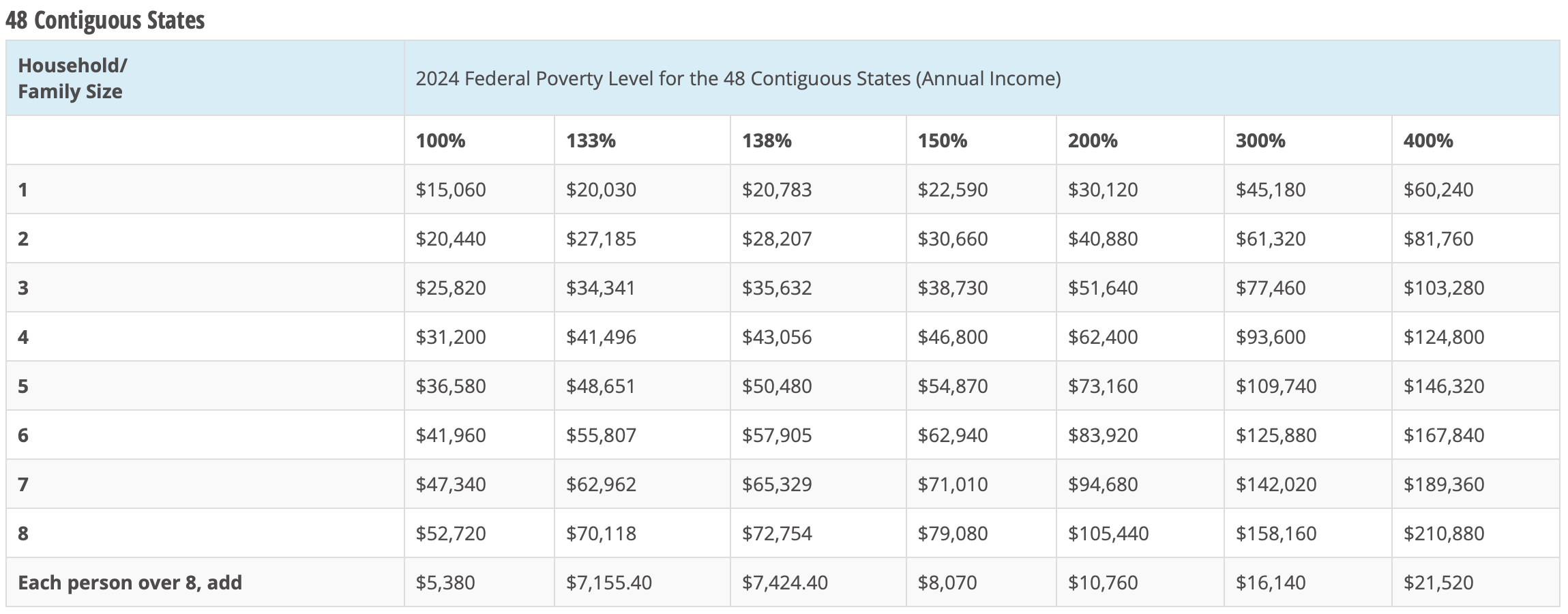
Once you start receiving healthcare subsidies from the Federal government, especially as an early retiree millionaire, you may be less inclined to donate money. If you do donate, you might start thinking that you’re wasting the healthcare subsidy benefits you’re receiving.
The mindset of accepting government aid after achieving financial independence could potentially make you more reluctant to give back through charitable donations. You become so accustomed to scraping, saving, and maximizing every government benefit available that giving becomes an afterthought.
If you don’t get health care subsidies as an early retiree, then you can easily justify not giving as well. After all, you are paying a huge premium to subsidize others, which is a form of giving.
The Expectation Of Paying Less Taxes In Retirement
Receiving healthcare subsidies as a millionaire is likely an unintended consequence of the government’s healthcare system. What’s also interesting is that once you primarily earn investment income, as opposed to W-2 income, your tax liability decreases significantly.
Below are the 2024 long-term capital gains tax rates by income level. If you are single, you can earn up to $47,025 and pay zero federal long-term capital gains tax. If you are married and filing jointly, you can earn up to $94,050 and pay zero federal long-term capital gains tax. Quite favorable!
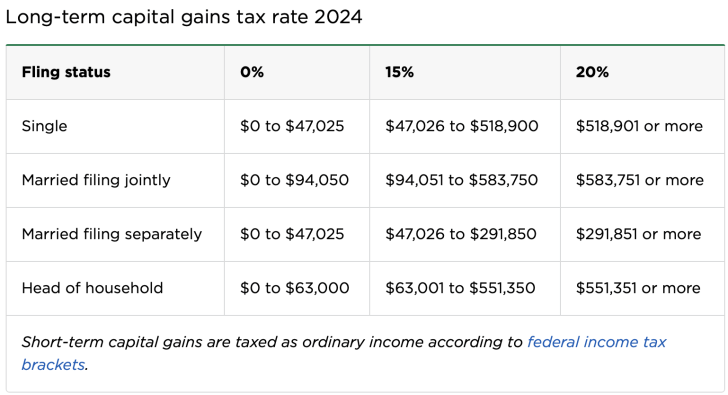
However, what may happen is that if you become accustomed to not paying income and capital gains taxes and also start receiving healthcare insurance subsidies, you might develop a mindset that you are always entitled to such benefits.
When we start expecting to pay nothing, it may become harder to give back to others or charitable causes.
What About Giving More Precisely Due To Having More Cash Flow?
One could argue that once you don’t pay taxes and get subsidies from the government, it frees up more disposable income to give. But that doesn’t often happen due to human nature. Most of us have the desire to hold onto our wealth, no matter how much we have. The government understands this, which is why it has implemented a progressive tax system.
According to the chart by the Tax Foundation, the share of income taxes as a percentage from the top one percent has increased. The top one percent pay more than their fair share of income taxes because their share of total taxes paid is far greater than their share of income.
And if you are FIRE, you are unlikely earning a top one percent income of ~$650,000+ from your investment portfolio. On the contrary, you are likely earning an income in retirement that falls in the bottom 50% range in retirement, which is why you qualify for healthcare subsidies and lower tax liabilities.
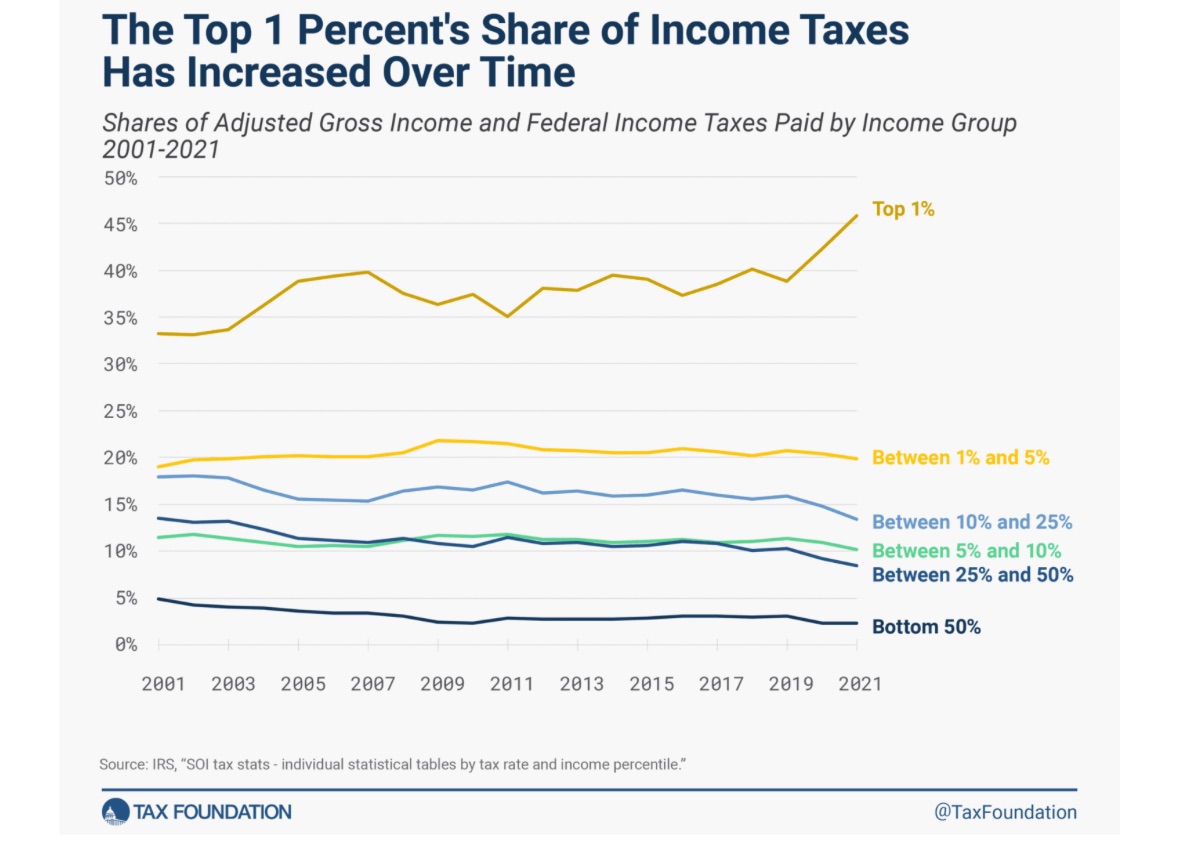
Nobody Volunteers To Pay More Taxes Either
Now consider the 40%+ of working Americans who pay no income taxes, according to the Tax Policy Center. This percentage has been high for an extended period and even surged to about 60% during the pandemic.
No rational person who isn’t paying income taxes is going to be willing to voluntarily contribute, say, even just $100 to the Federal government to help pay income taxes for our country. Perhaps those who don’t pay income taxes are donating some of their money to charity instead, but it’s difficult to determine.
Taxes can be considered a form of charity since the money gets redistributed to help those who have less. Yet, even if people who don’t pay income taxes know this, there isn’t any desire to pay more, if any taxes by post people.
Human nature tends to make us want to hold onto our wealth and maximize personal benefits. If you don’t have the security of a job and are facing unknown variables in the future that may cost a lot, you tend not to give as much.
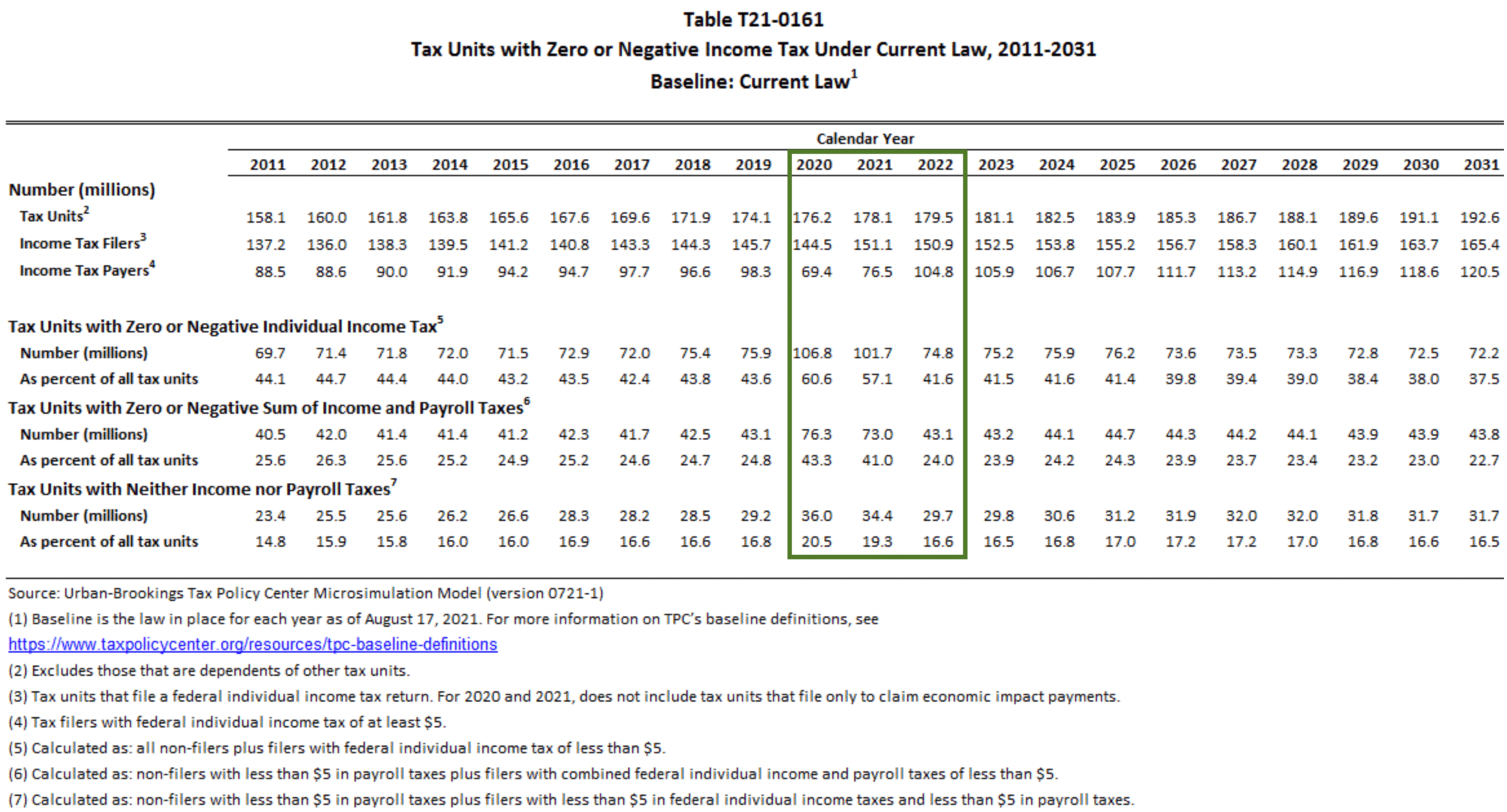
Having A Day Job Will Give You More Confidence To Give
When you are FIRE, you rely primarily on your investments for income to sustain your lifestyle. Given that you can’t control how your investments perform, you are at their mercy to a certain extent. Sure, you can make asset allocation and investment decisions, but once those decisions are implemented, you relinquish control.
When you do not generate active income to buffer any investment declines, it becomes much harder to give charitably. We see this phenomenon play out with charitable giving declining during bear markets.
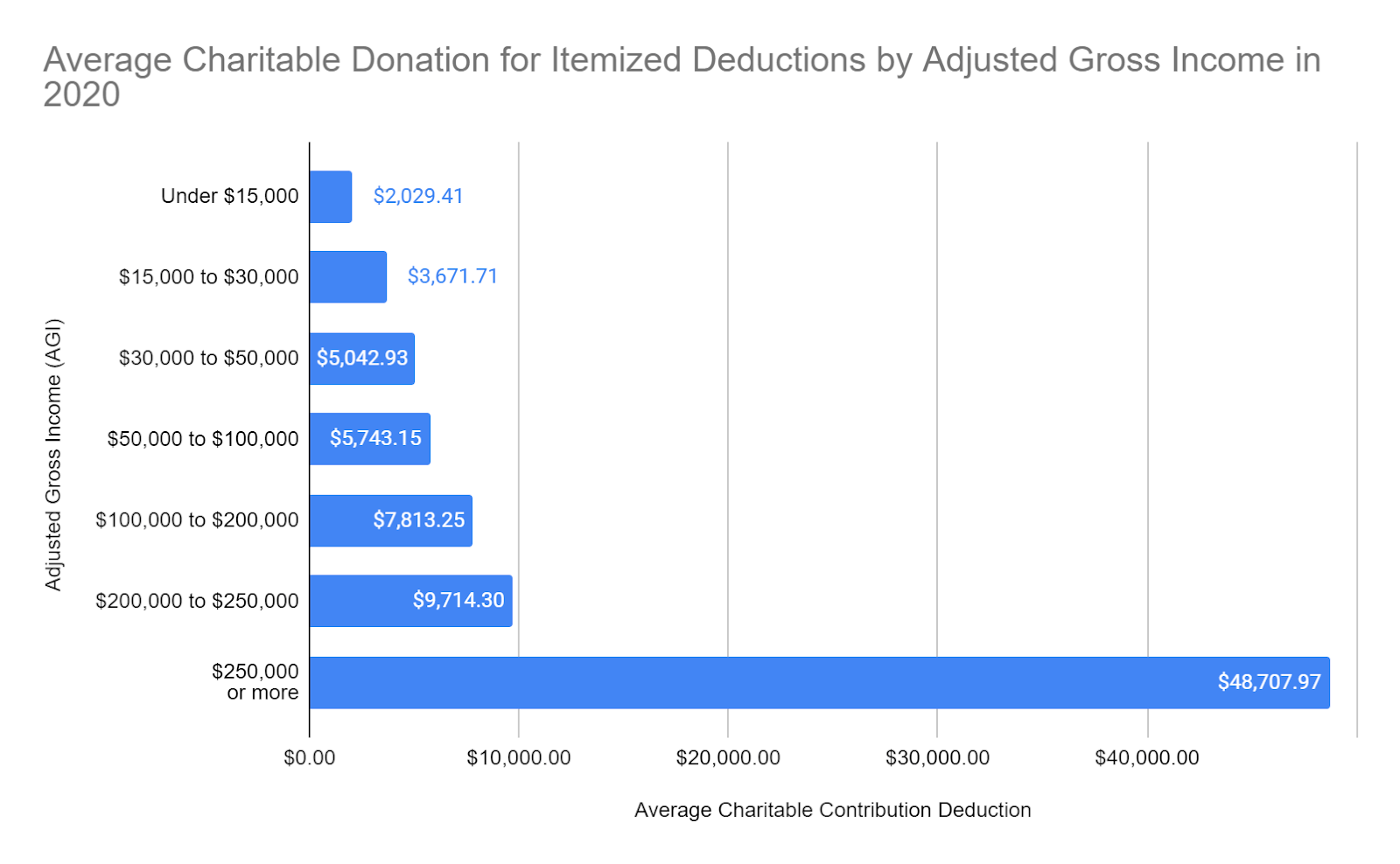
However, if you do have a day job, you can count on a reliable paycheck. You might even receive a year-end bonus and stock options. In such a scenario, giving is much easier because you have more financial security, even though you might not be technically financially independent. An employed person perhaps has the illusion of financial security, which can facilitate more generous giving.
If you want to be less stingy and give more, it may be better to hold onto your job for a more extended period. Achieving FIRE can make you much more sensitive to your cash flow needs and changes in the economic environment, potentially hampering charitable inclinations.
Just look at the men who claim to be financially independent, yet are unwilling to let their working wives join them in retirement. Some will even get on podcasts and not even recognize their wive’s income contributions. With so much fear about being financially independent, these folks won’t be giving much at all to charity.
Be Dynamic In The Amount You Give
Just as it’s wise to be flexible with your retirement withdrawal rate as circumstances change, it’s also good to be flexible with your rate of giving. Sure, targeting a set percentage of your income to give is a quick and easy way to consistently give as your income change. But feel free to adjust the percentage as well.
We all know that giving, whether it’s money, time, or knowledge, is one of the greatest feelings. I’m sure we all want to give more. However, expenses come up all the time, and there’s always the fear of the unknown. Our responsibility is to take care of ourselves and our families first before we can effectively help others.
If we can’t give money temporarily, that’s fine. We can volunteer our time or share our knowledge until we replenish our funds and feel more financially secure. We can also organize or participate in fundraisers.
The reward for helping others has personally been a huge motivator for why I’ve continued to write on Financial Samurai since 2009. Some readers have been reading since college and are now in their mid-30s with kids. Others have gone through financial disasters and are now financially independent. So awesome!
I can’t wait to reach a point where money is abundant in our household again. As I climb out of a tight cash flow situation, I’m slowly starting to give more again. I don’t want to be too cheap. At the end of the day, the more we can save, the more we can give away.
So there you have it. Pursuing financial independence and achieving financial independence can potentially make you more frugal and less charitable. Be cautious of this tendency. The FIRE movement is already facing criticism about its participants not contributing enough to society. A lack of charitable giving might just be another black mark against it!
Related: Donor-Advised Fund: A Tax-Efficient Way To Give Stock
Reader Questions And Suggestions
There are plenty of criticisms about the FIRE movement. Is being a stingy person who doesn’t give much to charity one of them? How have you been able to balance giving to charity and saving for your financial future? Have you noticed a lack of giving, paying taxes, and receiving healthcare subsidies by those who’ve achieved FIRE as well? For those curious, we ended up giving $5,000 to the school fundraiser.
To achieve financial independence sooner, you must diligently track your finances. I use Empower, a remarkable free wealth management tool I’ve trusted since 2012. Empower goes beyond basic budgeting, offering insights into investment fees and retirement planning.
Listen and subscribe to The Financial Samurai podcast on Apple or Spotify. I interview experts in their respective fields and discuss some of the most interesting topics on this site. Please share, rate, and review!
To expedite your journey to financial freedom, join over 60,000 others and subscribe to the free Financial Samurai newsletter. You can also get my posts sent to your inbox as soon as they are published by signing up here.
The Stinginess Of Financial Independence is a Financial Samurai original post. Established in 2009, Financial Samurai is among the largest and most trusted independently-owned personal finance websites today.



